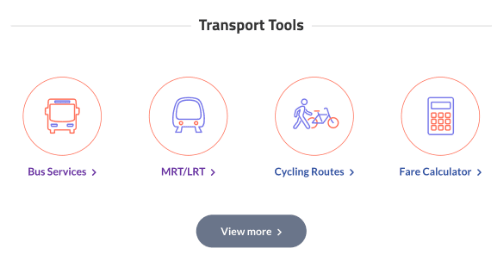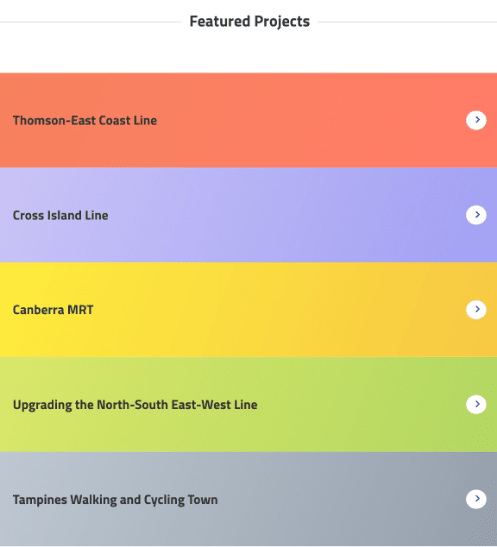Autonomous Vehicle (AV) technology is set to transform land transport and open up new mobility options in Singapore in areas of commuting, logistics and utilities. AVs will be an important part of Singapore’s Smart Mobility solutions, improving our public transport commute in Singapore’s journey to becoming a Smart Nation.
Autonomous Vehicles

Why AVs?
Singapore faces urban mobility challenges such as manpower constraints and changing travel needs and expectations. Innovative mobility solutions, through technology such as AVs, can help us overcome these challenges and needs effectively and safely.
In the coming years, we envision that AVs can bring about the following benefits:

Enhanced Mobility
AVs improve mobility by providing safe, efficient transport. They enable concepts like demand-responsive bus services, which improve flexibility and coverage by adapting routes and schedules to real-time travel needs.

Alleviate Manpower Constraints
Singapore is facing a tight labour market compounded by an ageing population. AVs can alleviate manpower constraints by taking over routine and repetitive work, and operate at any time of the day without the limitations of human fatigue. An example of this would be a robosweeper operating at night.

Potential to Enhance Road Safety
AVs are equipped with high-fidelity sensors that act as their ‘eyes’, enabling them to perceive their surroundings and navigate safely through complex, mixed traffic conditions while adhering to road and path rules. By maintaining consistent attentiveness and adherence to traffic regulations, AVs can contribute to safer roads for everyone.
AV Safety & Testing
The safety of passengers and other road users is of paramount importance, be it during trials, pilot deployment, or eventual full operational services.

In Singapore, all AVs must undergo safety assessments conducted at CETRAN (Centre of Excellence for Testing and Research of AVs-NTU) AV Test Centre, before they can be deployed on our roads. The assessments have been developed by LTA and CETRAN, with inputs from Traffic Police.
Comprehensive insurance coverage against third-party liability and property damage is a prerequisite for AV operation. AVs are also required to be equipped with a 'blackbox' data recorder, storing crucial vehicle telematics for investigative purposes.
For more information about the conditions under which AVs are allowed on our roads, please refer to the Road Traffic Rules for AVs under the Road Traffic Act. The rules have been introduced in 2017 to regulate AV trials, with safeguarding commuter and other road users’ safety and interests as the topmost objective.

The Centre of Excellence for Testing and Research of AVs-NTU (CETRAN) was established since August 2016 as a collaboration effort between the government and NTU, to build up technical capabilities and knowledge in the area of testing and certification of AVs in Singapore.
To facilitate the testing of AV navigation controls in a real-world environment, the two-hectare CETRAN AV Test Centre was launched on 22 Nov 2017, and it is designed to replicate the different elements of Singapore’s roads with common traffic schemes, road infrastructure and traffic rules.
AV Assessment Framework
Step 1: Identify Trial Area
To conduct an AV trial in Singapore, the applicant should propose the exact trial area and classification of the trial that will be based on the following:
- Public or private roads
- Public or private paths
Step 2: Submit Application
Based on the trial area classification, submit the respective application to Autonomous_Vehicle@lta.gov.sg:
Roads
- Public Roads: AV Application Form for Public Roads (PDF, 557kB)
- Private Roads: Application for Waiver of Registration (coming soon)
Paths
- Public Paths: Application to Deploy on Public Paths (coming soon)
- Private Paths: Application for Waiver of Registration (coming soon)
Step 3: Embark on Assessment Track to Deploy on Public Roads or Public Paths
After the AV is registered and approved for trial, the AV can embark on its approved assessment track:
- Assessment Track 1: Deployable AV Solutions; or
- Assessment Track 2: Developmental AV Solutions
Deployable AV Solutions Assessment Track (Public Roads)

To qualify for the Deployable AV Solutions Assessment Track, the applicant must present a viable use case with realistic deployment plans. Additionally, the selected AV model must demonstrate a strong track record of similar use cases involving multiple AVs over a period of at least one year.
Once the AV has qualified for the Deployable AV Solutions Assessment Track, it will be eligible for driverless deployment upon successful completion of the following:
- Milestone 1 (M1) Test: A closed-circuit test consisting of basic manoeuvres that ensure the AV can navigate safely on roads.
- Demo for stakeholders: Demonstration of the AV running on the deployment site.
- Document Review: Establishes the applicant’s processes in managing the AV operation for the intended use case in Singapore.
- Remote Operations Assessment: A holistic assessment of the applicant’s ability to manage remote operations via teleoperations, including its system, setup and operational procedures.
- Deployment Readiness Assessment (DRA): A time-based, on-road data-backed continuous assessment, where the AV is deployed in its approved deployment route. This verifies the AV and its teleoperation system’s ability to safely handle the operations as defined by the applicant. The AV Operator remains on-board the AV to intervene, if necessary.
Developmental AV Solutions Assessment Track (Public Roads)
Applicants in the Developmental AV Solutions Assessment Track are required to pass the M1 Test. For complex deployments (e.g. heavy traffic, complex traffic junctions, etc.), the AV will be required to pass the Milestone 2 (M2) Test. The AV Operator is required to remain on-board throughout the deployment.
The AV will be able to deploy without an on-board AV Operator by joinning the Deployable AV Solutions Assessment Track after successfully completing the following:
- M2 Test: Test components include document review, simulation, closed-circuit test consisting of advanced manoeuvres, and on-road test.
- Good Records: Accumulate good records for a fixed timeframe after passing the M2 Test.
- Viable Use Case: Present a viable use case with realistic deployment plans.
Assessment Tracks (Public Paths)
For details of the various Assessment Tracks for AVs on public paths, please email Autonomous_Vehicle@lta.gov.sg for more details.
AV Industry Happenings
Find out what are the current on-going AV trials in Singapore

Photo credit: FairPrice Group
Autonomous Logistics Vehicle at Joo Koon
Driven by the decreasing number of truck drivers, FairPrice Group's Supply Chain Business has deployed the Zelos Z10 to transfer pallets of goods between its warehouses in Joo Koon.

Photo credit: Resorts World Sentosa
Autonomous Bus at Resorts World Sentosa (RWS)
Complementing the current shuttle service to ferry passengers resort-wide, RWS deployed the WeRide Robobus at selected hours as a pilot service since April 2024.

Photo credit: MooVita
Autonomous Bus at Ngee Ann Polytechnic (NP)
Since January 2023, MooVita has been providing autonomous campus shuttle services within the NP campus.


Photo credit: WeRide
Robosweepers at Esplanade – Theatres on the Bay & Marina Coastal Drive
To boost productivity and improve the working conditions of its staff, Chye Thiam Maintenance deployed the WeRide S1 Robosweeper to sweep the outdoor areas of Esplanade and the WeRide S6 Robosweeper for road sweeping in the Marina Coastal Drive area since October 2024.
More Information about AVs
How does an AV work?
The AV first senses its surrounding location by gathering inputs from its suite of sensors: cameras, LiDAR (Light Detection and Ranging), RADAR (Radio Detection and Ranging), IMU (Inertial Measurement Unit) and GNSS (Global Navigation Satellite System).
With the sensory inputs, the AV is then able to plan a path to bring itself towards its destination safely, while avoiding obstacles, obeying traffic rules, etc.
Finally, the AV acts on its plan, by using its motion control and actuation modules to translate the motion commands into physical motions.
This process of sense-plan-act happens in real-time continuously, over and over again!
Identifying AVs and Trials on Roads
1

The blinking yellow beacon (circled in red) indicates an AV is on autonomous mode.
2

Resources
Useful link
Application form
Reach Out to Us!
Will using an AV be helpful to your business, but not sure how to navigate regulatory challenges? Do you have an AV solution for Singapore, but don’t know where to start?
Whether you are an AV user, operator or solution provider, we are here to help! Reach out to us at Autonomous_Vehicle@lta.gov.sg and we will be happy to assist.



















